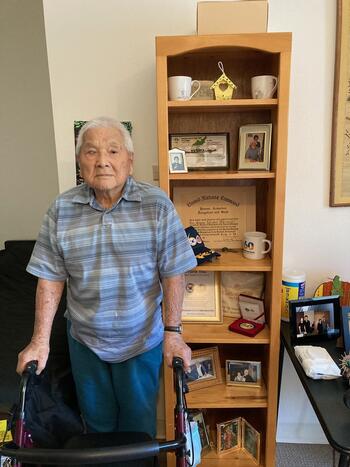SPICE’s Educational Offerings on Korea
SPICE’s Educational Offerings on Korea
SPICE offers a series of Korea-focused lesson plans, an online course for U.S. high school students, and teacher professional development opportunities.

Last week, I had the chance to visit one of my uncles, George Mukai (92), who is a veteran of the Korean War. He recently moved into an assisted-living facility and had very few items delivered from his home to his new residence. One thing that he did have delivered was a curio cabinet that contains Korean War-related items including medals, a cap, a United Nations Command certificate, and a piece of wire from the DMZ.

This month marks the 71st anniversary of the beginning of the Korean War on June 25, 1950. After my visit with George, I started to reflect on the work that my colleagues (past and present) at SPICE have done to promote the study of Korea in U.S. schools and directly to students in the United States. They are:
- Waka Brown
- Jonas Edman
- Andre Haag
- Joon Seok Hong
- HyoJung Jang
- Grace Kim
- Se-Woong Koo
- Stefanie Lamb
- Annie Lim
- Rennie Moon
- Rylan Sekiguchi
They have developed extensive curriculum on Korea. The offerings can be found on this webpage and includes offerings such as the following:
- Colonial Korea in Historical Perspective
- Divided Memories: Comparing History Textbooks
- Dynamics of the Korean American Experience
- Economic Development: The Case of South Korea
- Inter-Korean Relations: Rivalry, Reconciliation, and Reunification
- Traditional and Contemporary Korean Culture
- Uncovering North Korea
- U.S.–South Korean Relations
In addition, the Sejong Korea Scholars Program, an online course for high school students in the United States, has been offered by SPICE since 2013. The SKSP annually selects 20–25 exceptional high school students from throughout the United States and engages them in an intensive study of Korea and U.S.–Korea relations. Selected students participate in the online course on Korea from February to June of each year. The current instructor is Jang.
Lastly, SPICE offers annual summer institutes to middle school and high school teachers in partnership with the National Consortium for Teaching about Asia, and also the East Asia Seminars for Teachers in Hawaii. These are facilitated respectively by Edman, Naomi Funahashi, and Sekiguchi. These programs focus in part on Korea and are funded by the Freeman Foundation.




